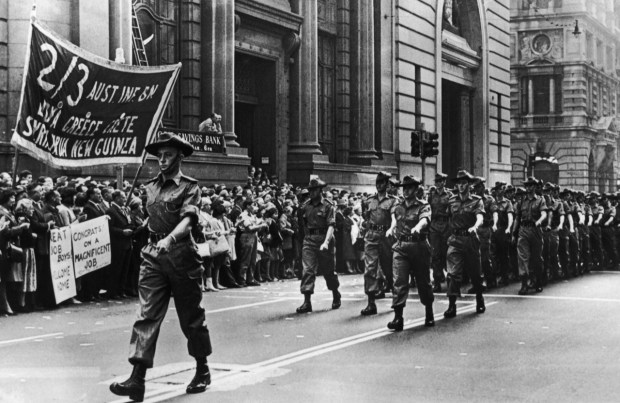Here’s the question: why does it take a piece of investigative journalism to convince people that the Construction Forestry and Maritime Employees Union is up to no good? OK, ‘up to no good’ is a gross understatement – the better description includes bullying, blackmail, extortion, corruption, kickbacks and violence.
Don’t get me wrong here. I think the painstaking and, at times, dangerous exploration undertaken by Nick McKenzie and his colleagues at Nine Entertainment is both high quality and insightful. But in essence, it simply fleshes out the details, while bringing them up to date, of what we have always known about the nefarious activities of the CFMEU.
The only conclusion is that the messenger matters. When a left-wing mainstream media company publishes these damning revelations day after day as well as producing an investigative episode of the television program, 60 Minutes, it’s at that point that implicated politicians take some notice. And it was not coincidental that John Setka, Victorian CFMEU secretary, decided to retire just as the program was about to go to air.
Here’s the thing: the CFMEU’s misdemeanours – again I am being kind – have been laid bare for many, many years. There was the Cole Royal Commission into the Building and Construction Industry commissioned by the Howard Coalition government and released in 2003. In that report, the extent of the venality of the CFMEU’s conduct was spelt out as well as the associated economic costs.
The Howard government set up the Office of the Australian Building and Construction Commissioner as a specific way of reining in the unacceptable activities of the CFMEU. It was abolished by the Gillard Labor government, an action demanded by its trade union brethren and financiers.
The Heydon Royal Commission into Trade Union Governance and Corruption was commissioned by the Abbott Coalition government, with the report released in 2015. In that report, the CFMEU was found to have acted in ‘willful defiance of the law’. It was recommended that criminal charges of blackmail be laid against John Setka, state secretary of the CFMEU.
Examples of inappropriate behaviour by CFMEU officials were outlined, included death threats, extortion, gross neglect, inadequate record keeping, large donations received from employers and ‘other serious criminal matters’.
The Coalition government subsequently re-established the Australian Building and Construction Commission as well as the building code that applied to companies. In many ways, the code was more powerful than the ABCC itself, although the powers of the ABCC to compel witnesses to testify and initiate prosecutions were important.
The code restricted mandatory union membership, controlled the right of entry of union officials and prevented subcontractors from being forced to sign up to CFMEU pattern agreements. Building companies were only able to tender for government-funded contracts on the condition that the building code was adhered to.
Having said this, the specific consequences of the Heydon Royal Commission were extremely disappointing. The vast majority of potential criminal prosecutions were never pursued; even John Setka got off scot-free.
Even so, a trickle of cases against the CFMEU has made it to the Federal Court, with multiple judges expressing their extreme dismay about the conduct of CFMEU officials.
For instance, Judge Vasta concluded in a case involving a CFMEU official harassing the managers of a sub-contractor that ‘it seems the CFMEU feel they can usurp Parliament and that they can set the law in this country. There is no place for such an attitude in Australian society. This goes to the heart of the industrial relations regime of this country.’
More telling were the comments of Judge Mordy Bromberg of the Federal Court and former Labor candidate for a parliamentary seat. ‘The absence of any evidence of compliance systems within the CFMEU is particularly alarming given the heavily critical comments of the CFMEU made by this Court in many cases over recent years… An organisation faced with a litany of contraventions over an extended period of time, which repeatedly incurs not only significant financial penalties but also pointed judicial criticism, would necessarily put in place measures to change… unless such behaviour was condoned by the senior leadership of the organisation.’ Quite.
It’s important to note here that competition law basically exempts the conduct of trade unions, with the exception of difficult-to-prove secondary boycott action. This is notwithstanding the profound anti-competitive impact of much of their behaviour.
By and large, state police forces have been reluctant to investigate criminal behaviour by trade unionists, in part because of the influence of the police associations. No one should dob in a mate is the thinking there. In any case, it can be dangerous work: CFMEU officials play for keeps and some have been very well trained in motorcycle gangs and the underworld.
The CFMEU leadership is also very strategic: they ensure their members are extremely well paid and enjoy many perks and allowances while playing the sympathy card of protecting worker safety. This in turn creates a cohort of very grateful and loyal union members. When a lollipop worker can earn up to $200,000 per year, you know there is a problem, but it’s a case of Christmas coming all at once for the lucky workers. It’s just best to be related to or know someone in the CFMEU hierarchy if you want one of these jobs.
The big picture here is that the appalling conduct of the CFMEU has been known for many years but the revelations by Nine Entertainment have made them much harder to ignore. The accusation of simple union-bashing which applied to previous royal commissions and the ABCC – a claim made by many Nine Entertainment journalists in the past – is much less convincing. The fact that the CFMEU has sought to drive an indigenous labour hire firm out of business is one reason, among many, to take this matter seriously.
On the face of it, both the federal and some state governments are now prepared to act – appointing administrators, a confidential inquiry – but don’t be fooled. The real aim is to create a short-term distraction and hope the mainstream media loses interest and moves on. We know that Albo is very fond of the wet lettuce leaf, a liking shared by the state premiers
The reality is that the twin powers of money and delegates make the CFMEU an unstoppable force within the Labor party. It influences decisions about the projects that are funded – the Suburban Rail Loop in Melbourne makes no sense at all, but it will keep CFMEU members in well-paid jobs for many years ahead. The real tragedy is that everyone else pays a very high price for this fetid connection.
Got something to add? Join the discussion and comment below.
You might disagree with half of it, but you’ll enjoy reading all of it. Try your first month for free, then just $2 a week for the remainder of your first year.













